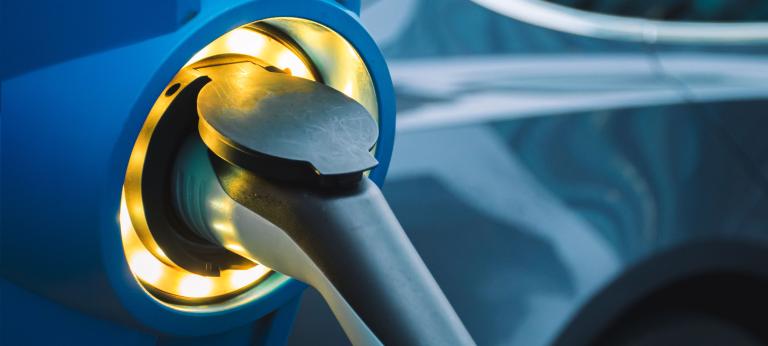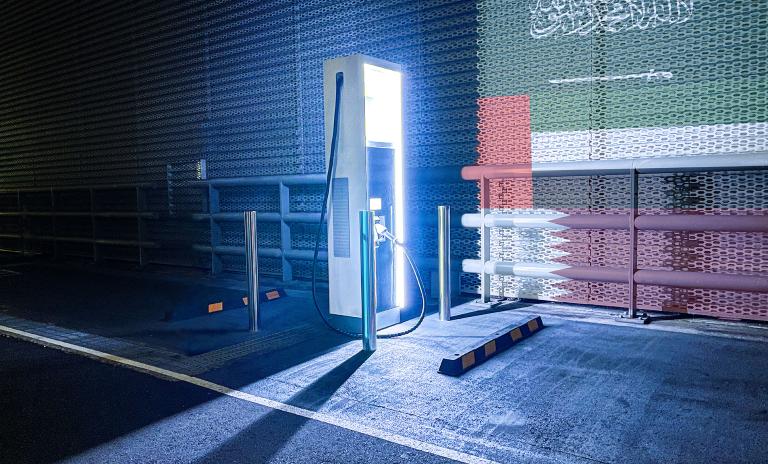EV Charging Index: Expert insight from the Middle East
![{[downloads[language].preview]}](https://www.rolandberger.com/publications/publication_image/23_2077_art_ev_charging_index_deep_dive_middleeast_cover_download_preview.jpg)
EV adoption is very low in the Middle East, although public and private sector involvement is growing. Learn more in the Roland Berger EV Charging Index 2023.


EV adoption remains very low in the Middle East, although the UAE is seeing some growth. Public charging infrastructure for the region’s small EV parc is above average. Involvement from local the local public and private sectors in e-mobility is gradually beginning to increase.

EV adoption in the Middle East remains low. The UAE leads the way with a 3% sales penetration rate, mostly due to its younger population, but this is still well below the global average of 16%. Neither Saudi Arabia (KSA) nor Qatar managed above 1% in our most recent Index. Consumers use EVs predominantly for commuting and other short trips. Charging is typically performed either at work or at home, with communities and buildings offering dedicated spaces to EVs.
Both KSA and UAE are investing in EV OEMs, which will likely bring favorable policy measures for EVs. Ceer is a brand-new Saudi EV manufacturer, while the government is also backing US manufacturer Lucid, which is set to open a factory in the kingdom later in 2023. China’s NWTN will open an EV plant in UAE’s Khalifa Industrial Zone Abu Dhabi, and M Glory, a UAE-based OEM, is setting up an EV plant in Dubai Industrial City.
The development of charging infrastructure is not homogeneous across the region, with the UAE leading the way, although initiatives are developing in KSA, Qatar and other regions. Overall, the area’s public vehicle-to-point ratio is an impressive 6.5 – well ahead of the global average of 15.9. The small EV parc is obviously a major factor in this.
In Dubai, DEWA's EV charging network has now expanded to 350 stations and is expected to reach 1,000 public stations by 2025. Etihad Water & Electricity has announced an EV charger initiative to install a range of AC and DC chargers across the north of UAE, while ADNOC Distribution is partnering TAQA to build and operate EV charging stations.
Meanwhile, in Saudi Arabia, Petromin, a leading lubricant supplier and automotive service provider, has set up Electromin, a wholly owned subsidiary for EV solutions. In 2022, Electromin announced the rollout of 100 EV charging points across KSA together with an accompanying mobile application.
UAE’s electricity sector is regulated by each emirate, meaning there are different rules across Dubai, Abu Dhabi and other emirates. However, this will require convergence in terms of regulation and targets to develop the EV charging infrastructure more effectively. Dubai now offers free parking for EVs as well as free Salik tags to cover highway tolls. Abu Dhabi also offers free parking and tolls. Nowhere in the UAE currently offers purchasing incentives for EVs.
In KSA, numerous government departments have recently introduced EV-related policies, although there is a fair degree of uncertainty around their potential impact, particularly due to vague statements in relation to EV standards. There are also numerous agencies and bodies in charge of different elements of EV charging infrastructure regulations, each of which demands compliance on different matters. Like the UAE, no streamlined incentive package is currently offered in KSA to incentivize EV purchases.
The low cost of petrol in the Middle East creates a barrier for switching to EVs – stronger government action is required across the region to boost EV adoption.
The largest player in the Saudi EV charging space is Electromin, which provides turnkey solutions for individuals, businesses and governments. In February 2023, Saudi telecom company TAWAL signed a strategic partnership with Electromin to enhance EV charging infrastructure in the kingdom. The collaboration aims to enable the installation and expansion of EV charging stations, which will be powered by TAWAL’s network of towers. In July 2023, Electromin also announced the roll-out of the first ultra-fast DC chargers in KSA.
![{[downloads[language].preview]}](https://www.rolandberger.com/publications/publication_image/23_2077_art_ev_charging_index_deep_dive_middleeast_cover_download_preview.jpg)
EV adoption is very low in the Middle East, although public and private sector involvement is growing. Learn more in the Roland Berger EV Charging Index 2023.
Sign up for our newsletter and get regular updates on Automotive topics.